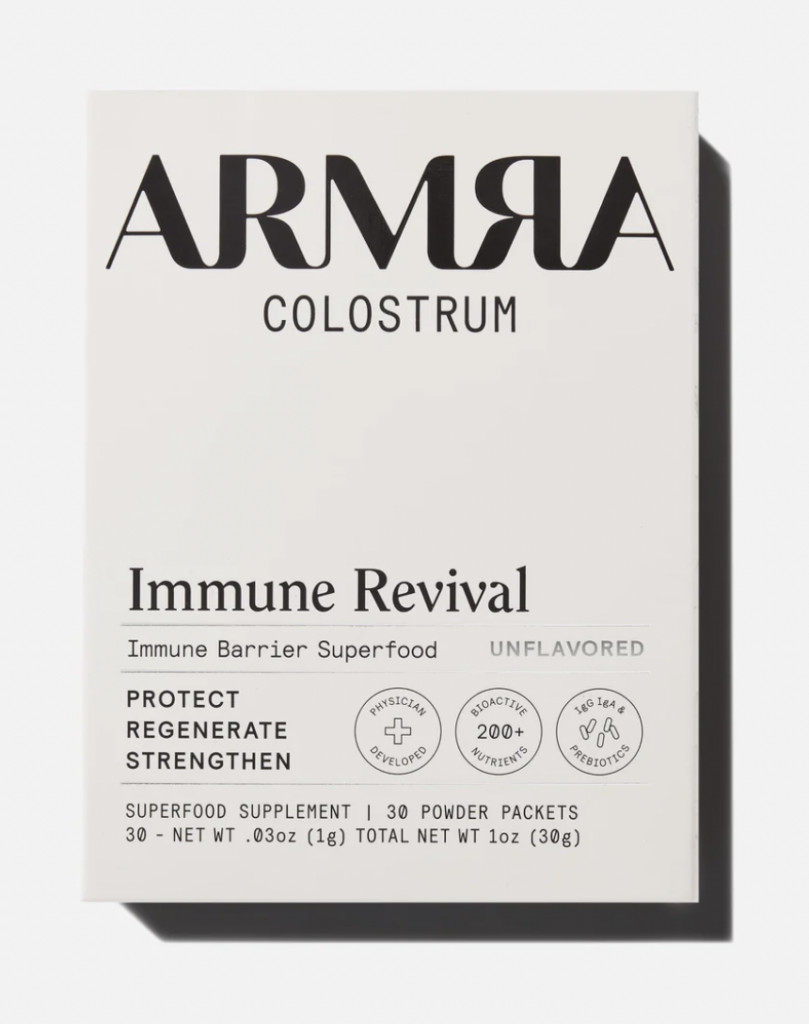With 2023 coming to a close, it’s time to up-level your supplement routine. Enter: colostrum. Yes, colostrum. This magical elixir is dubbed liquid gold for a reason. If you’re a mom, lactation consultant, neonatal nurse, or pediatrician (or work with newborns in any capacity!) you know the life-changing benefits of colostrum. It’s truly an unrivaled nutrient powerhouse. Although colostrum is traditionally associated with newborns and infants, adults can reap its rewards as well. From enhancing athletic performance to improving gut health, colostrum is a versatile supplement worth the shelf space. However, is colostrum better than collagen? Let’s dig in.

What is colostrum?
For context, there are three stages of breast milk: colostrum, transitional milk, and mature milk. Each plays a role in a newborn’s health. First comes colostrum. It’s produced towards the end of a woman’s third trimester (or in the first few days after birth). As long as a proper latch is established—and a mother chooses to breastfeed—colostrum will provide a newborn with all the nutrients, fluids, and calories it needs. Hence the name, liquid gold! No matter which mammal it comes from, colostrum contains a high concentration of antibodies, growth factors, and other essential nutrients.
How nutritious is colostrum?
It’s unparalleled. As the first nutrition we receive, colostrum contains all of the essential components our bodies need to thrive. It serves the vital function of protecting and strengthening an infant’s digestive system. In many ways, the nutrient profile—and immunological composition—of colostrum differs substantially from mature milk. For instance, compared to mature milk (which comes in about a month after a mother has given birth), colostrum is three times richer in vitamin A and 10 times richer in beta-carotene. This beta-carotene is what gives colostrum its golden yellow hue!

What is bovine colostrum?
Yes, colostrum is a source of nutrients for infants, but did you know that colostrum can be consumed during other phases of life? That’s right. Similar to human colostrum, bovine colostrum is rich in vitamins, minerals, fats, carbohydrates, disease-fighting proteins, growth hormones, and digestive enzymes. In recent years, bovine colostrum supplements have skyrocketed.
bovine colostrum’s ayurvedic roots
While colostrum is biologically necessary for newborns, new research shows the benefits of colostrum at any point in your life. Luckily, you don’t need to buy breast milk to do this. Instead, you can opt for bovine colostrum supplements. Taking colostrum may seem far-fetched, but adults have been using bovine colostrum for thousands of years—specifically, in Ayurvedic medicine. Think about it this way: bovine colostrum is simply a more nutrient-dense version of what many of us grew up drinking—cow’s milk.

What is The Best bovine colostrum supplement?
As mentioned, bovine colostrum supplements come from cows. Colostrum is pasteurized and dried into pills or powders, which can then be mixed with liquids (water, smoothies, etc.). Bovine colostrum typically has a light yellow color and a subtle taste. Its smell resembles buttermilk. My favorite bovine colostrum supplement? ARMRA. They offer an incredibly potent colostrum supplement—sourced from grass-fed cows. It tastes delicious. Mt. Capra’s goat colostrum is another option. By incorporating colostrum into my daily routine for a few months, I’ve noticed a difference in my immune health, energy, digestive health, and skin! It’s been a game-changer.
Can you take bovine colostrum every day?
Yes! However, be sure to discuss taking bovine colostrum with your healthcare practitioner. Allergic to dairy? Don’t fret. ARMRA colostrum contains no casein, which is the protein that most people with a true dairy allergy react to. A typical dosage is about half a teaspoon. Not only are bovine colostrum products well-tolerated and very nutrient-dense, but they’re also non-toxic and safe for human ingestion. In powdered form, you can put it right in your mouth (my favorite way) or add it to a cool beverage, like water or a smoothie.
Pregnant or nursing? ARMRA is a safe, nutrient-dense superfood with a host of whole health benefits for both mother and baby—and was developed by a pediatric neurologist. With your pediatrician’s approval, it’s also approved for children.

What about ethical issues?
Inevitably, consuming colostrum brings up an ethical debate. Does it deprive the newborn calf of the essential nutrition it needs to grow properly? This comes down to sourcing. Ultimately, this is where quality and transparency matter. Mt. Capra, Ancestral Supplements, and ARMRA use the purest colostrum from grass-fed cows / goats. They only collect overflow colostrum after baby calves are fed what they need.
Is colostrum better than collagen?
In recent years, collagen supplements have skyrocketed. So, where does colostrum fit into the mix? Both typically come from cows, but they’re very different nutrients. In fact, side-by-side, colostrum and collagen have no direct correlation. On one hand, collagen is always in your body. It’s essential for bodily functions.
Colostrum, on the other hand, isn’t a necessity—other than at birth. Furthermore, while colostrum is a type of milk produced in the early stages of lactation, collagen is a structural protein found in the skin, bones, tendons, and cartilage. From a nutrition standpoint, colostrum is known to help boost immunity and gut health, whereas collagen aids in tissue, cartilage, and bone health.

7 Health Benefits of Colostrum
In many ways, colostrum is magical. After all, it sustains, protects, and nurtures newborns. And in exciting news, growing research shows that adults can reap these same benefits. For overall health and performance, colostrum can help rebuild your immune barriers, restore your microbiome, and empower your body with the blueprint to thrive from the inside out.
1. Boosts Immune Function
Colostrum has high levels of immunoglobulins (antibodies) that help protect against viruses, bacteria, and other harmful pathogens. By supplementing with colostrum, women can support their immune systems, making them less susceptible to illness and infection.
2. Enhances muscle growth
Because colostrum contains a number of growth factors—including IGF-1 and TGF-beta—it can stimulate muscle growth and repair. This makes colostrum an ideal supplement for female athletes or women who are looking to improve their overall strength.
3. strengthens Gut Health
Colostrum is rich in lactoferrin and other bioactive compounds, helping support the growth of healthy gut bacteria. This can be particularly beneficial for women who suffer from digestive issues, such as irritable bowel syndrome (IBS), bloating, or constipation.
4. Promotes Skin Elasticity
When it comes to maintaining healthy skin, look no further than colostrum. It can help stimulate the production of collagen, elastin, and other proteins that are essential for skin health. This can help reduce the appearance of fine lines, wrinkles, and other signs of aging—making it an ideal supplement for women concerned about aging skin.
5. Supports Bone density
Colostrum has a number of nutrients that are essential for maintaining strong and healthy bones, including calcium, magnesium, and vitamin D. This makes colostrum a beneficial supplement for those at risk of osteoporosis or other bone-related conditions.
6. Reduces Inflammation
Colostrum is rich in cytokines, which are proteins that can help regulate inflammation in the body. By supplementing with colostrum, women can reduce inflammation throughout their bodies. This can be beneficial for a range of conditions—including arthritis, allergies, and autoimmune disorders.
7. improves Brain Function
Colostrum contains a number of peptides and other compounds that can help improve cognitive function and enhance mental clarity. This can be particularly beneficial for women who are experiencing age-related cognitive decline or who are looking to improve their focus and productivity.

Disclaimer
To recap, colostrum is a nutrient-rich supplement that can provide a range of health benefits for women. If you’re interested in trying bovine colostrum, chat with your healthcare provider to ensure it’s safe and appropriate for your individual needs.
This article is for informational purposes only. It is not, nor is it intended to be, a substitute for professional medical advice, diagnosis, or treatment and we recommend that you always consult with your healthcare provider.



Leave a Reply